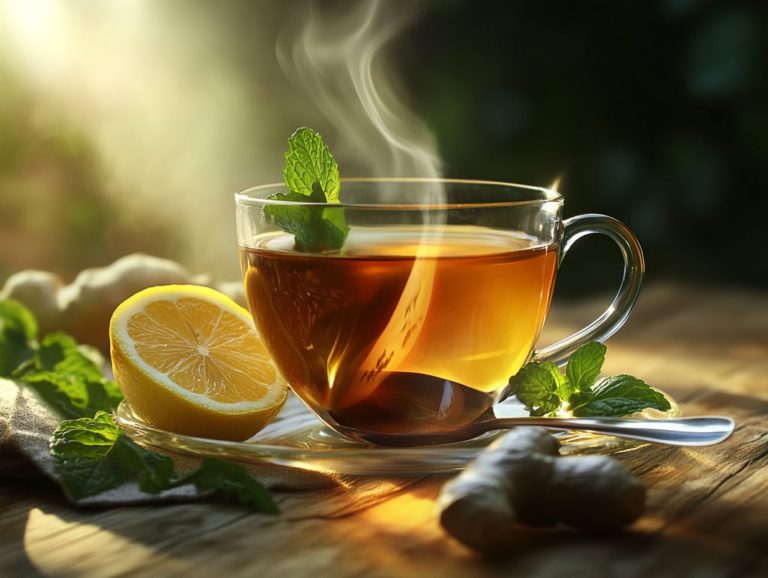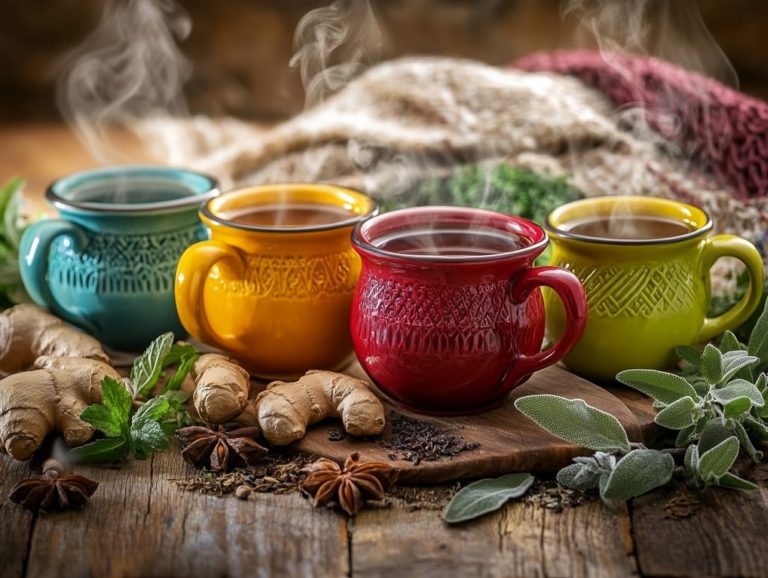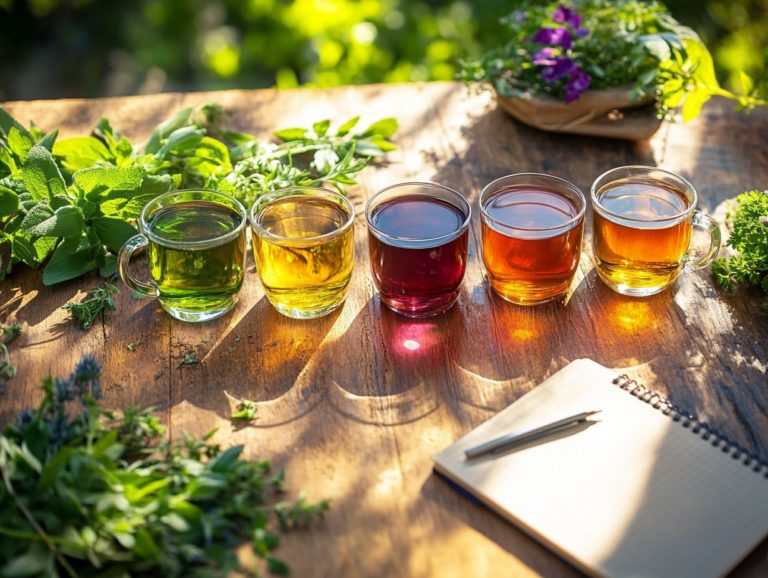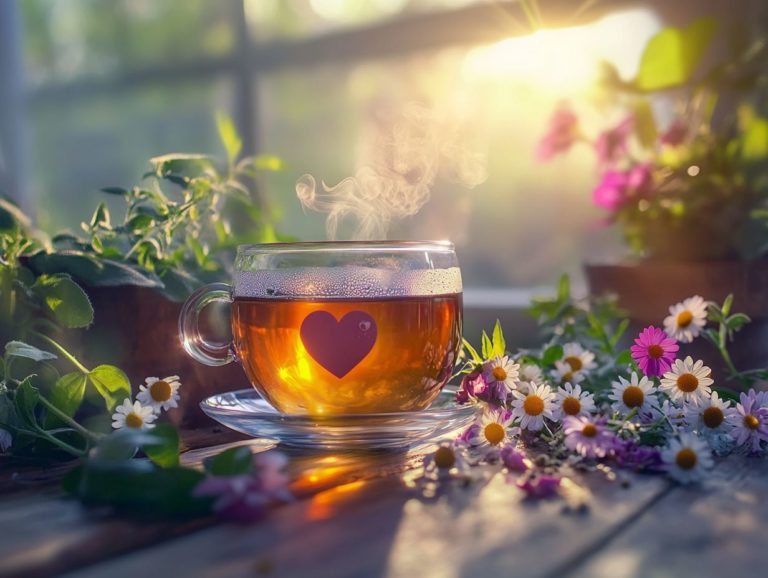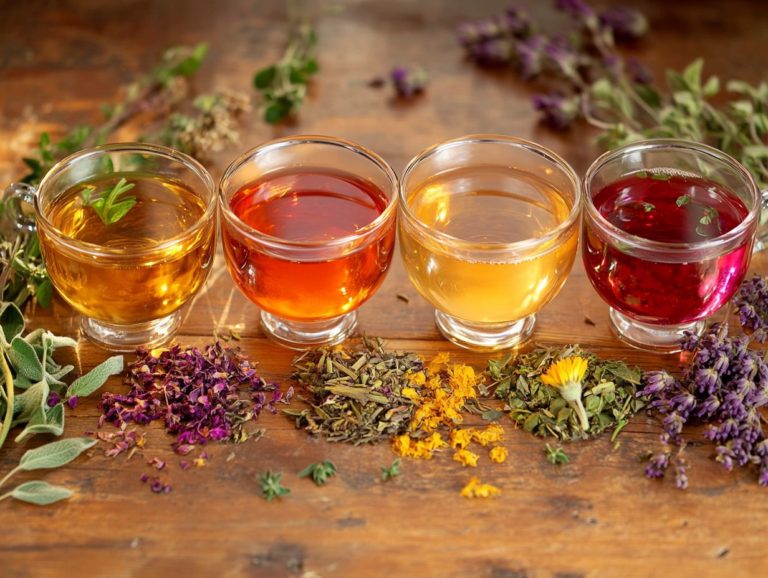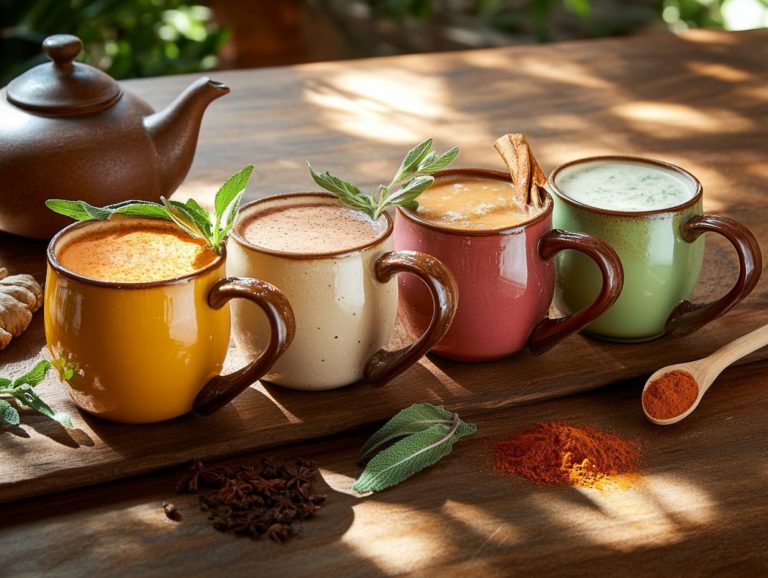Herbal Tea Variations: Creative Flavor Combinations
Herbal tea presents a delightful opportunity for you to sip your way to wellness. Transform an ordinary experience into something truly extraordinary with the right blend of unique flavors.
Picture yourself enjoying soothing lavender and chamomile or zesty ginger and turmeric. Join us as we explore a diverse array of creative flavor combinations that tantalize your taste buds while offering significant health benefits.
Learn how to craft your own herbal tea blends, discover the ideal moments to savor these soothing brews, and uncover tips for enhancing their flavors to perfection.
Whether you’re a seasoned herbalist a specialist in using herbs for health or just embarking on your herbal adventure, there s something here for you. Dive in and uncover your new favorite cup of herbal teas!
Contents
- Key Takeaways:
- 1. Lavender and Chamomile Tea
- 2. Peppermint and Lemon Tea
- 3. Ginger and Turmeric Tea
- 4. Hibiscus and Rosehip Tea
- 5. Lemon and Thyme Tea
- 6. Cinnamon and Orange Tea
- 7. Jasmine and Green Tea
- 8. Echinacea and Elderberry Tea
- 9. Rooibos and Vanilla Tea
- 10. Lemongrass and Ginger Tea
- 11. Raspberry and Mint Tea
- 12. Blueberry and Lavender Tea
- 13. Sage and Lemon Tea
- 14. Peach and Ginger Tea
- 15. Apple and Cinnamon Tea
- What Are the Benefits of Herbal Tea?
- Frequently Asked Questions
- What are some creative flavor combinations for herbal tea variations?
- Can I mix different types of herbs to create my own herbal tea blend?
- Are there any health benefits to drinking herbal tea?
- Can I add sweeteners to my herbal tea?
- How should I steep herbal teas for maximum flavor?
- Are there any herbal teas that are caffeine-free?
Key Takeaways:
- Expand your tea drinking experience with unique flavor combinations like lavender and chamomile, hibiscus, ginger and turmeric, and elderflower.
- Create your own DIY herbal tea blends for a personalized and flavorful experience using herbal ingredients.
- Herbal tea can be enjoyed at any time of day, with different tea blends offering various health benefits.
1. Lavender and Chamomile Tea
Lavender and chamomile tea is a delightful fusion of two aromatic herbs. Each herb offers its own unique flavors and health benefits. This calming blend envelops you in a soothing aroma while delivering a range of therapeutic effects, making it the perfect choice for unwinding after a long day.
Whether you enjoy it solo or alongside a light snack, crafting this herbal tea with fresh or dried lavender and chamomile flowers promises a delightful experience rich in both flavor and wellness.
In terms of flavor profiles, lavender brings a floral, slightly sweet note. Chamomile adds a gentle apple-like quality that harmonizes beautifully. To elevate the calming experience, experiment with various herbal combinations. Consider adding hints of mint or lemon verbena for a refreshing twist.
If you re venturing into tea blending tips, keep in mind that the ideal steeping time for this mix is around five to seven minutes. For a touch of sophistication, pair your tea with delicate pastries or light sandwiches. Remember, proper tea storage is key to preserving freshness; place dried herbs in glass jars in a cool, dark place to keep their vibrant flavors intact.
2. Peppermint and Lemon Tea
Peppermint and lemon tea offers a delightful fusion of refreshing minty flavors and zesty brightness. This revitalizing beverage tantalizes your taste buds while bestowing numerous health benefits.
This enchanting brew delivers a burst of flavor while acting as a natural digestive aid, soothing an upset stomach and alleviating gas. The menthol in peppermint relaxes digestive muscles, making it an ideal choice after a hearty meal. Meanwhile, lemon shines with its vitamin C content, potentially enhancing your immune system and promoting overall wellness.
For a simple DIY herbal tea, steep fresh peppermint leaves and lemon slices in hot water. You can sweeten the mixture with a touch of honey for that extra health boost. Alternatively, blend dried peppermint leaves with lemon balm to create a soothing herbal mix perfect for any time of day.
What s your favorite blend? Share your herbal tea recipes with us!
3. Ginger and Turmeric Tea
Ginger and turmeric tea is a delightful herbal blend that combines the spicy zing of ginger with the earthy notes of turmeric, creating a soothing drink brimming with anti-inflammatory health benefits.
This charming beverage not only tantalizes your taste buds but also supports your immune system. Thanks to ginger’s rich antioxidant properties and turmeric’s active compound, curcumin, they work harmoniously to strengthen your body’s defenses against common ailments while promoting better digestion.
To brew this invigorating tea, simply grate fresh ginger and turmeric, then steep them in hot water for about 10-15 minutes. For an extra flavor boost and added health benefits, you can try adding:
- Lemon juice
- Honey
- A sprinkle of black pepper, which enhances turmeric absorption
You can try adding variations like cinnamon or a dash of cayenne pepper; these can elevate the flavor profile while amplifying the tea’s health advantages.
4. Hibiscus and Rosehip Tea
Hibiscus and rosehip tea is a vibrant infusion that combines the tartness of hibiscus with the sweet depth of rose petals, resulting in a delightful beverage brimming with antioxidants and floral flavors.
This enchanting combination offers a wealth of health benefits. With its rich vitamin C content, rosehips work wonders for your immune system, while hibiscus is lauded for its potential to lower blood pressure and support heart health.
If you’re eager to enjoy this fusion at home, consider using dried hibiscus flowers and rosehip fruits. Storing them in glass jars will help keep their vibrant colors and nutritional properties intact.
When it s time to indulge in this tea blend, pairing it with light salads, fresh fruits, or even sweet pastries can enhance your experience, adding a refreshing flavor to your meals.
5. Lemon and Thyme Tea
Lemon and thyme tea presents a delightful interplay of bright lemon acidity and the savory essence of thyme, crafting a flavor profile that is both refreshingly invigorating and comfortingly aromatic.
This exquisite blend tantalizes your taste buds. It also provides numerous health benefits. Rich in vitamin C, lemons bolster your immune system, while thyme helps fight off fungi and bacteria, supporting your respiratory health. Together, they create a soothing drink that warms the body and uplifts the spirit.
If you’re considering growing this herbal duo, planting lemon balm alongside various thyme varieties in a sun-kissed corner of your garden is a splendid idea. To prepare the tea, simply steep fresh thyme leaves and squeeze in some lemon juice, enhancing the natural flavors for a wellness-boosting brew.
6. Cinnamon and Orange Tea
Cinnamon and orange tea offers a fragrant blend that beautifully combines the warming spice of cinnamon with the bright citrus notes of orange, crafting a comforting beverage that’s perfect for those chilly evenings.
This delightful concoction warms your body and lifts your spirit, making it an ideal choice for enhancing your mood while supporting digestion. The natural sweetness of orange harmonizes effortlessly with the rich, earthy tones of cinnamon, creating a flavor profile you can savor any time of day.
For a calming tea, steep one cinnamon stick and the zest of one orange in boiling water for about 10 minutes. Once it’s steeped, strain it and enjoy. A splash of honey or agave syrup can elevate the sweetness, and pairing this tea with ginger scones or almond biscotti will enhance the experience, providing a delightful contrast to this aromatic drink.
7. Jasmine and Green Tea
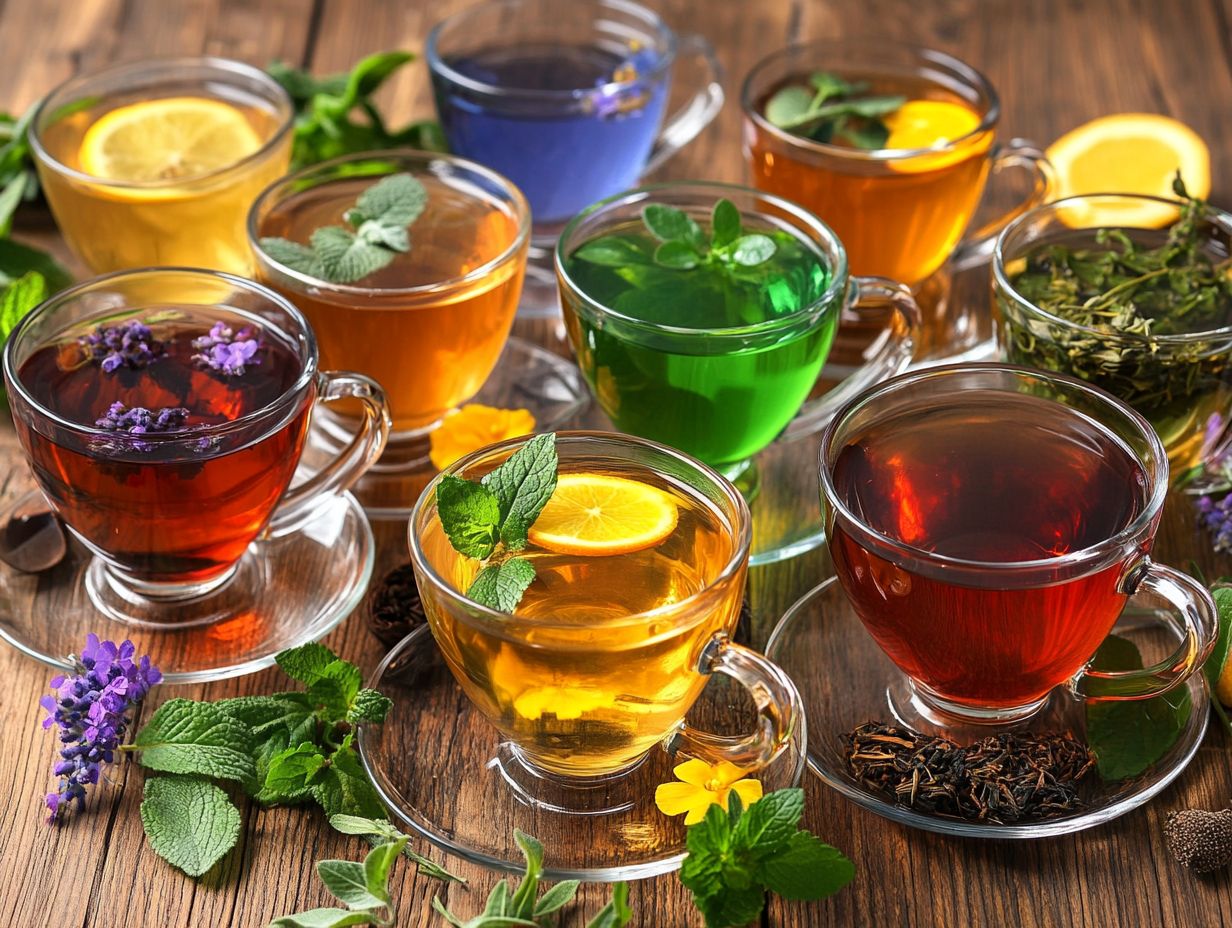
Jasmine and green tea create a pairing that feels like a match made in heaven. The delicate floral essence of jasmine petals mingles beautifully with the light, grassy notes of green tea, resulting in a fragrant beverage celebrated for its calming health benefits.
This harmonious blend not only delights your senses but also encourages relaxation by reducing stress and elevating your mood. Green tea is well-known for its ability to help with weight management and can boost your metabolism.
To perfect the balance between the soothing jasmine and vibrant green tea, consider experimenting with various steeping times and tea ratios to craft your ideal brew. You can also explore blending herbal teas for a unique experience.
Whether you prefer loose leaves or tea bags, using brewing techniques like the traditional gong fu or a simple steep in hot water will unveil the best flavors. Each cup promises a delightful and healthful experience.
8. Echinacea and Elderberry Tea
Echinacea and elderberry tea is a strong herbal tea that artfully combines the immune-boosting properties of echinacea with the antiviral benefits of elderberry. It’s an exceptional choice for combating colds and flu.
This delightful brew wraps you in cozy warmth and tastes amazing! When preparing this tea, steep dried echinacea roots and elderberries together for at least 10-15 minutes to fully extract their beneficial compounds. Elevating the blend with honey, ginger, or lemon can add both flavor and extra health benefits.
If you re feeling adventurous, mix echinacea and elderberry with other immune-supportive herbs like astragalus or reishi mushroom for a powerhouse infusion tailored to your preferences. Remember to store these herbs in a cool, dark place in airtight containers to preserve their potency.
9. Rooibos and Vanilla Tea
Rooibos and vanilla tea is an indulgent blend that lets you savor the naturally sweet, nutty flavors of rooibos alongside the aromatic richness of vanilla. This delightful, caffeine-free beverage is perfect for any time of day.
This infusion is a treat for your taste buds and offers a wealth of health benefits! Rooibos is rich in antioxidants that help promote overall health and well-being. It supports heart health and improves digestion. To enhance the sweetness, consider adding a touch of honey, agave syrup, or stevia.
You can elevate your tea experience by crafting your own herbal blends with rooibos. Incorporate spices like cinnamon or soothing chamomile for a unique sipping experience that s both comforting and utterly delicious.
10. Lemongrass and Ginger Tea
Lemongrass and ginger tea is a refreshing drink that beautifully blends the zesty notes of lemongrass with the warm spice of ginger. It’s celebrated for its digestive aid properties.
This aromatic brew tantalizes your taste buds and supports a healthy digestive system. The compounds in lemongrass work wonders to soothe bloating and indigestion, while ginger is widely recognized for its ability to alleviate nausea and promote overall gut health.
To prepare this invigorating tea, chop fresh lemongrass stalks and simmer them with slices of ginger in water for about 10 15 minutes. Use a tea strainer to separate the flavors from the solids for a smooth sip.
For an added twist, pair this tea with light snacks such as rice cakes or fresh fruit. This combination enhances your experience while you enjoy the benefits of these powerful herbs.
11. Raspberry and Mint Tea
Raspberry and mint tea is a delightful blend that harmonizes the sweet, tart flavor of raspberries with the invigorating coolness of mint. It s the ideal beverage for those sweltering summer days!
This refreshing tea tantalizes your taste buds. It also offers numerous health benefits. Raspberries are brimming with antioxidants, vitamins, and fiber, helping boost digestion and supporting overall gut health. Mint, known for its calming effects, not only aids digestion but also enhances your hydration routine.
To enjoy this herbal delight, steep fresh raspberries and mint leaves in boiling water. After a few minutes, you ll have a refreshing drink!
For an added twist, consider introducing a splash of lemon or a drizzle of honey. This will enhance the flavor profile while providing additional health benefits!
12. Blueberry and Lavender Tea
Blueberry and lavender tea is a truly unique infusion, harmoniously blending the sweet, fruity notes of blueberries with the delicate floral aromas of lavender. The result? A calming and refreshing beverage that delights your senses and supports your well-being.
This exquisite blend tantalizes your palate. It also offers many health benefits, making it ideal for those who enjoy flavor while prioritizing wellness. Blueberries are celebrated for their powerful antioxidant properties and provide excellent protection against oxidative stress, while lavender is revered for its calming effects on both mind and body. Together, they create a soothing tea experience that helps alleviate stress and promote relaxation.
To elevate this infusion, brew a simple herbal tea by steeping dried lavender buds alongside fresh or frozen blueberries in hot water. A touch of honey or a squeeze of lemon can further enhance the flavor profile!
13. Sage and Lemon Tea
Sage and lemon tea is a soothing blend that perfectly marries the earthy notes of sage with the bright acidity of lemon, crafting a unique flavor profile that is both refreshing and calming.
This herbal infusion delights your palate and brings a wealth of health benefits. Sage is renowned for its remarkable ability to promote relaxation and enhance mood, while lemon is celebrated for its digestion-boosting properties.
To create this invigorating tea at home, simply steep a teaspoon of dried sage leaves in a cup of boiling water for about five minutes.
Afterward, add a slice of fresh lemon or a teaspoon of lemon juice for that extra zing! This delightful concoction is a must-try in the morning or the perfect way to unwind in the evening!
14. Peach and Ginger Tea
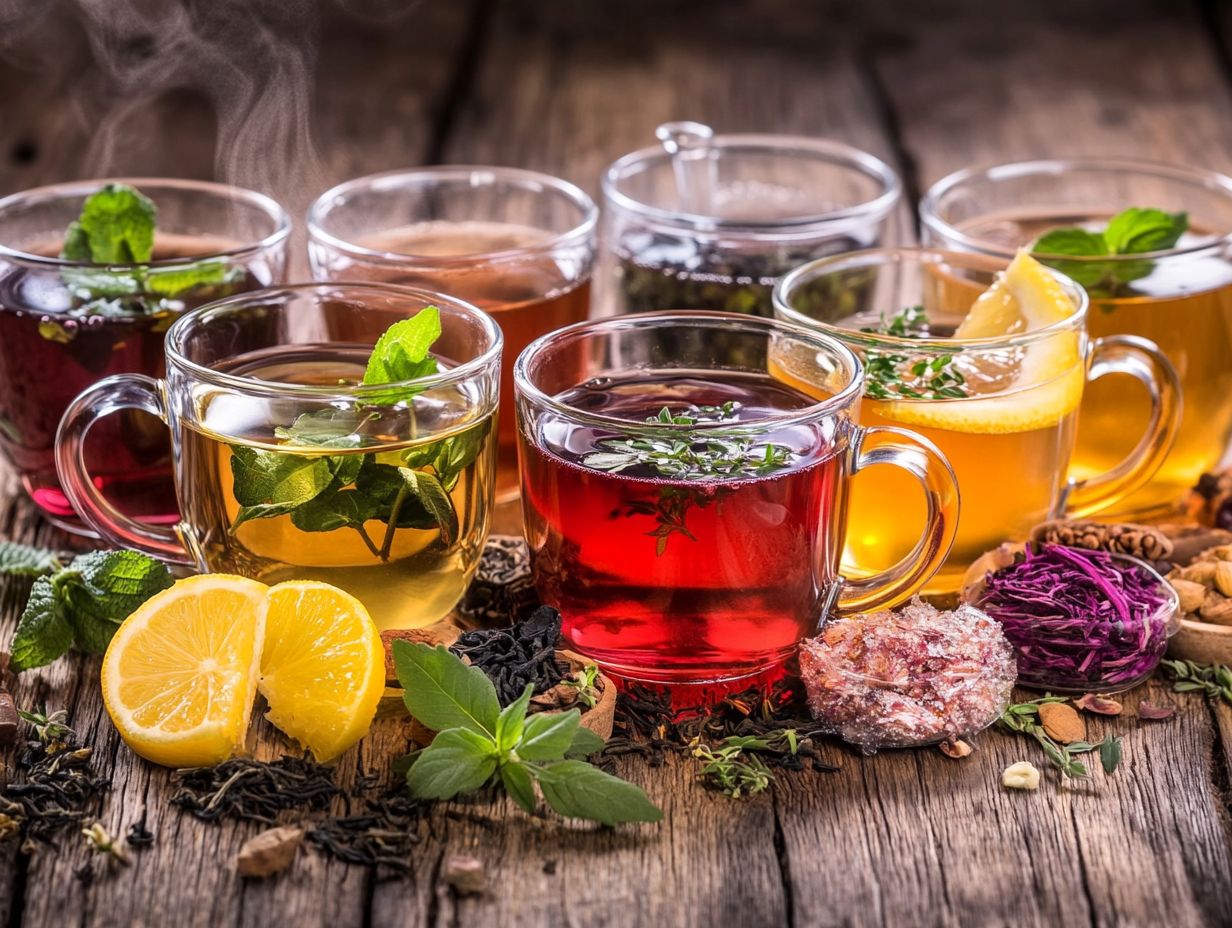
Peach and ginger tea is a vibrant infusion that brings together the sweet, juicy essence of peaches and the warm spice of ginger, creating a delightful beverage suitable for any season.
This enchanting blend not only delights your palate but also offers a many health benefits. Peaches are packed with antioxidants and vitamins A and C, aiding in digestion and promoting skin health. Meanwhile, ginger is celebrated for its anti-inflammatory properties and its remarkable ability to soothe nausea.
As you craft this tea, think about pairing it with light snacks such as:
- Almond biscotti
- A fresh cheese platter
These accompaniments will elevate your tasting experience! If you prefer a hint of sweetness, a drizzle of local honey or a splash of agave syrup can enhance the flavor without overshadowing the natural essence of the fruits.
15. Apple and Cinnamon Tea
Apple and cinnamon tea is a classic mix that brings together the sweet, crisp taste of apples with the warm, spicy notes of cinnamon. It s a comforting drink that s particularly enchanting in the fall.
This delightful combination transports you to cozy autumn afternoons. It evokes a sense of nostalgia while providing warming properties to soothe you on cold days.
To create an even more inviting moment, consider enhancing the brewing process with a dash of nutmeg or clove; these spices add delightful depth to the flavor profile.
If you’re eager to elevate your experience, steeping the blend with chamomile transforms it into a calming herbal tea that gently soothes the senses. You can also add a hint of ginger for a zesty kick that beautifully complements the sweetness, turning a simple drink into a nourishing experience perfect for the colder months. For more details on how to make your own herbal tea at home, explore various recipes and tips.
What Are the Benefits of Herbal Tea?
Herbal tea presents a wealth of health benefits, from its calming effects that foster relaxation to its digestive aids that enhance gut health. This makes it an exceptional choice for wellness enthusiasts like you.
By leveraging the capabilities of nature, herbal teas bring together various botanicals celebrated for their therapeutic properties. Take chamomile, for example; it’s well-known for its soothing qualities, offering gentle relaxation and promoting sleep perfect for your evening routine.
On the flip side, ginger works wonders for digestion, alleviating nausea and boosting overall gut health, which is vital for maintaining your energy levels throughout the day.
Then there s echinacea, which shines for its ability to strengthen the immune system, helping you fend off colds and other illnesses. To fully reap these benefits, it s essential to choose high-quality herbal ingredients; their potency directly impacts the effectiveness of the tea, ensuring you receive maximum wellness support.
How Can You Create Your Own Herbal Tea Blends?
Making your own herbal tea is fun and rewarding! It allows you to combine herbs and flavors tailored to your personal palate while enjoying the myriad health benefits that various ingredients offer.
To embark on this flavorful adventure, begin by gathering a selection of herbs, each with its own unique characteristics and benefits. Precision is key, so measuring your herbs accurately with a kitchen scale will help you strike the perfect balance between bold and subtle flavors.
Having a variety of herbs on hand can elevate your creations, such as:
- Chamomile – calming effects
- Peppermint – refreshing kick
As you craft your blends, pay close attention to flavor balance; the goal is a harmonious taste that s neither overwhelming nor bland. Don t shy away from experimenting with different combinations sometimes, the most unexpected pairings can lead to delightful discoveries!
What Are the Best Times to Drink Herbal Tea?
The optimal times to indulge in herbal tea can vary based on the specific type and its intended health benefits. Certain blends are perfect for evening relaxation, while others work wonders as digestive aids during meals.
Take chamomile tea, for example. Its soothing properties make it an ideal evening companion, promoting restful sleep and calming your mind after a hectic day. A refreshing cup of peppermint tea post-meal can work wonders for digestion and alleviate any bloating you might experience.
If you’re in need of a morning pick-me-up, consider reaching for ginger tea. It’s invigorating and can kickstart your metabolism while enhancing circulation.
Start enjoying these herbal delights in your daily routine today! Incorporating them can be as simple as setting a reminder for tea time, allowing your body’s natural rhythms to align with the healing properties of these wonderful plants.
Explore your own herbal tea recipes and experience the joy of making your unique blends!
How Can You Make Herbal Tea More Flavorful?
Ready to elevate your herbal tea experience? Try adding sweeteners like honey or agave syrup for a delightful twist! These can infuse a wonderful sweetness, making each sip more enjoyable while allowing the natural herbal notes to shine through.
Experimenting with food pairings can enrich your tea-drinking ritual. For instance, pairing a chamomile infusion with a light lemon scone creates a beautiful harmony, as the floral notes of the tea blend seamlessly with the citrusy flavor of the pastry.
Introducing spices like cinnamon or ginger adds a warm complexity that perfectly complements the tea’s characteristics, inviting you into a truly multifaceted sensory experience.
Are There Any Side Effects of Drinking Herbal Tea?
Herbal tea is usually safe, but be aware of possible side effects from certain herbs, especially in large amounts. Some herbs may cause adverse reactions if not approached carefully.
For example, while kava may help you unwind, it has been linked to liver damage when taken in high doses. Similarly, overindulging in St. John s Wort can interfere with various medications, potentially reducing their effectiveness.
Herbs like ginseng and echinacea can boost your wellness, but they might pose challenges for individuals with specific health conditions or allergies. Therefore, practicing moderation is key. It s wise to consult a healthcare professional to ensure safe use, particularly if you are pregnant, nursing, or on other medications.
Frequently Asked Questions
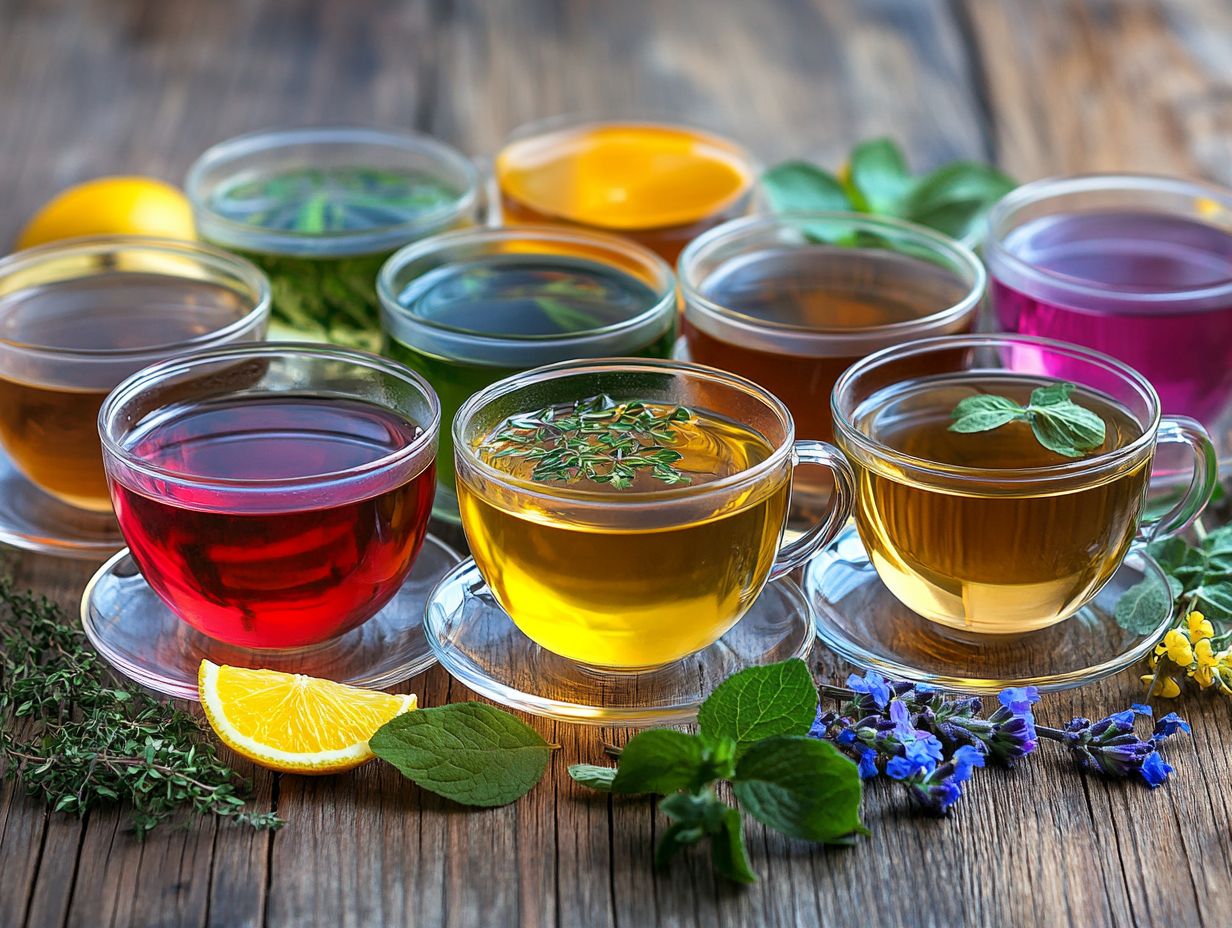
What are some creative flavor combinations for herbal tea variations?
Some creative flavor combinations for herbal tea variations include lavender and chamomile, lemon and ginger, mint and hibiscus, rose and vanilla, cinnamon and cardamom, and berry and sage.
Can I mix different types of herbs to create my own herbal tea blend?
Yes! You can mix different types of herbs to create your own unique herbal tea blend. Experiment with various flavor combinations to find your perfect blend.
Are there any health benefits to drinking herbal tea?
Yes! Herbal teas can provide various health benefits depending on the herbs used. For example, chamomile tea is known for its calming properties, while ginger tea can aid in digestion and boost the immune system.
Can I add sweeteners to my herbal tea?
Absolutely! You can add sweeteners such as honey, agave, or sugar to enhance your herbal tea’s flavor. However, some herbs already have natural sweetness, so you may find you don t need to add any sweeteners at all.
How should I steep herbal teas for maximum flavor?
The steeping time for herbal teas varies depending on the type of herb used. Generally, loose leaf herbal teas should be steeped for 5-10 minutes, while tea bags can be steeped for 3-5 minutes. Always follow the instructions on the packaging for the best results.
Are there any herbal teas that are caffeine-free?
Yes! Most herbal teas are naturally caffeine-free, as they are made from herbs and not the Camellia sinensis plant, which contains caffeine. However, some blended herbal teas may contain caffeine, so it’s best to check the ingredients list before purchasing.

